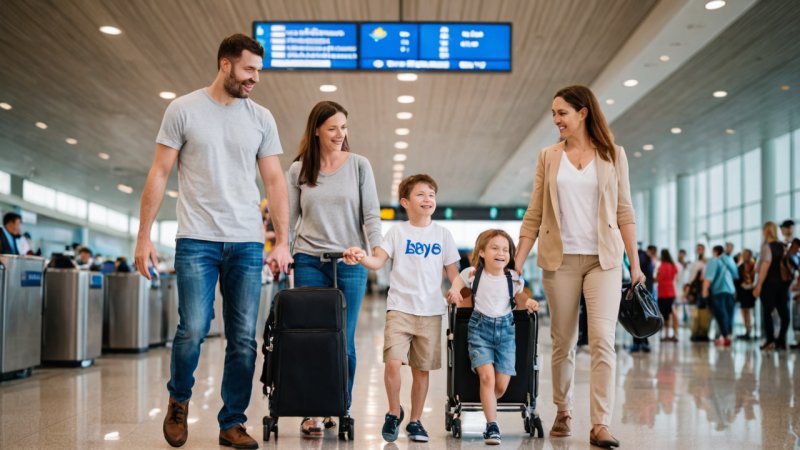Traveling with children is always an adventure, but when your child has special needs, the journey can present unique challenges and considerations. Whether it's sensory sensitivities, mobility issues, or the need for specific medical care, planning a trip can feel overwhelming. However, with the right preparation, families can create memorable experiences that cater to their child’s specific needs. In this comprehensive guide, we will explore essential tips, resources, and strategies for successfully traveling with special needs children.
Understanding Your Child’s Needs
Before embarking on any trip, it is crucial to understand your child’s specific needs and how they may impact travel plans. Here are some key considerations:
- Sensory Processing: If your child is sensitive to loud noises, bright lights, or crowds, consider destinations and activities that minimize sensory overload.
- Mobility Issues: Identify locations that accommodate wheelchairs or other mobility devices. Check for accessible transportation options and accommodations.
- Medical Needs: Ensure you have all necessary medications, medical equipment, and a list of local healthcare facilities at your destination.
- Communication: If your child has communication challenges, prepare alternative communication tools, such as picture boards or apps, to help them express their needs.
Choosing the Right Destination
Not all destinations are created equal when it comes to accommodating special needs travelers. Here are some factors to consider when selecting a destination:
- Accessibility: Look for destinations known for being inclusive, such as cities with accessible public transportation, wheelchair-friendly attractions, and accommodations.
- Family-Friendly Activities: Research activities that cater to children, such as interactive museums, parks with sensory-friendly features, or accessible nature trails.
- Medical Facilities: Ensure that the destination has reliable medical services, especially if your child has specific healthcare needs.
- Community Support: Connect with local support groups or organizations that can provide insights and assistance during your stay.
Planning Your Itinerary
Once you’ve chosen a destination, it’s time to plan your itinerary. Here are tips to make your travel schedule manageable:
- Include Breaks: Schedule regular breaks to avoid fatigue and sensory overload. This is especially important for children who may need quiet time to recharge.
- Flexible Scheduling: Be prepared to adjust your plans as necessary. Flexibility can reduce stress and accommodate your child's needs.
- Engaging Activities: Choose a mix of activities that cater to your child's interests, whether that’s visiting a zoo, a science center, or a beach.
- Advance Booking: Whenever possible, book accommodations and attractions in advance. Inform them of any special needs your child may have so they can accommodate accordingly.
Packing Essentials
Proper packing is essential for a smooth trip. Consider the following items to bring along:
- Medications: Pack enough medication for the entire trip, plus a few extra days’ worth, in case of delays.
- Comfort Items: Bring favorite toys, blankets, or sensory tools to help your child feel secure and comfortable during travel.
- Travel Documents: Keep important documents such as medical records, insurance cards, and emergency contacts handy.
- Emergency Kit: Prepare a small kit with first-aid supplies, snacks, and anything else that may be needed in case of an emergency.
Traveling by Air
Air travel can be particularly daunting for children with special needs, but with the right strategies, it can be manageable:
- Inform the Airline: Contact the airline in advance to inform them about your child’s needs. They may offer additional assistance, such as priority boarding or wheelchair services.
- Arrive Early: Give yourself ample time to navigate security checks. Arriving early can help reduce stress.
- Prepare for Security: Familiarize your child with the security process. Consider bringing a visual schedule to explain what will happen at the airport.
- Seating Arrangements: Choose seats that provide additional space or comfort, such as bulkhead seating if available.
Traveling by Car
If you opt for road trips, consider the following tips:
- Frequent Stops: Plan for frequent breaks to stretch, use restrooms, and allow your child to relax.
- Entertainment: Bring along books, games, music, or movies to keep your child engaged during long drives.
- Snacks: Pack a variety of snacks that cater to your child’s dietary needs and preferences.
- Adjustable Seating: Ensure your child’s car seat or booster seat is comfortable and correctly installed.
Accommodations
Choosing the right place to stay can make a significant difference in your travel experience. Here are some tips for finding suitable accommodations:
- Accessibility Features: Look for hotels or vacation rentals that highlight accessibility features, such as ramps, elevators, and accessible bathrooms.
- Room Configuration: Consider a suite or larger room to give your family space to relax and for your child to move around comfortably.
- Location: Choose accommodations near attractions and amenities to minimize travel time and reduce fatigue.
- Reviews and Recommendations: Read reviews from other families who have traveled with special needs children for insights and recommendations.
Finding Support and Resources
Before and during your travels, utilize resources and support networks to make the journey smoother:
- Online Communities: Join online forums and social media groups focused on traveling with special needs children for tips and advice from experienced travelers.
- Local Organizations: Research local organizations at your destination that provide support and resources for families with special needs.
- Travel Agents: Consider working with a travel agent who specializes in accessible travel to help with planning.
Creating a Positive Experience
Finally, it’s essential to focus on creating a positive travel experience for your child. Here are some tips:
- Involve Your Child: Involve your child in the planning process by allowing them to choose activities or destinations that interest them.
- Manage Expectations: Prepare your child for what to expect during the trip, including travel times, activities, and potential challenges.
- Positive Reinforcement: Use positive reinforcement to encourage your child to engage with new experiences and adapt to changes.
- Document the Journey: Capture memories through photos or a travel journal. This can create a sense of accomplishment and joy after the trip.






